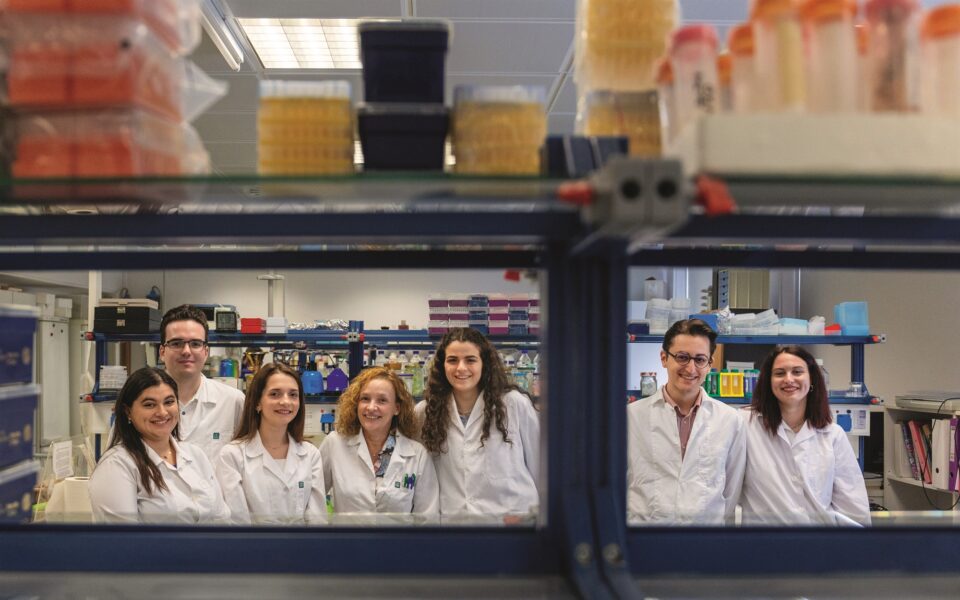The university that often achieves the impossible
The quiet success story of the Democritus University of Thrace’s Department of Molecular Biology and Genetics in Alexandroupoli

Athanasia, Marilena and Adamantia leaned carefully over the laboratory equipment. They were completing the final experiments before closing the envelope for the competition. From there, the three students and the rest of the team would travel to Paris and the iGEM international synthetic biology competition to present their groundbreaking idea: Can certain probiotics cure depression? Their idea finally bagged them a Silver Medal.
The second iGEM Thrace team (the first was founded in 2019) is just one of dozens of examples that demonstrate the dynamism, innovation, and high-level research and education taking place at the Department of Molecular Biology and Genetics at the Democritus University of Thrace in Alexandroupoli.
Starting with obstacles
Why was the only Greek department of molecular biology and genetics (in other cities the departments are usually just biology), which today has 700 undergraduate, 100 postgraduate and 40 PhD students, established in Alexandroupoli? It was at the end of the 1990s when European funds were made available to universities for the creation of new departments in what were then new and emerging subjects. The first students were admitted in 2000, and teaching staff were still scarce. Katerina Chlichlia, professor of molecular immunobiology (and former chair) in the department, was appointed in 2003 as only the fourth faculty member. Prior to that, she had been a postdoctoral fellow at the University of Heidelberg and other research centers in Germany. “We had to build the department from scratch, with a lot of effort, but also a lot of passion and enthusiasm. At central universities it is much easier because there is access to infrastructure, laboratories and collaborations. We built an isolated department in Thrace. I was not discouraged by the fact that it was in Alexandroupoli, but rather attracted by the fact that it was a newly established department with a very interesting and dynamic subject, molecular biology. Most of the scientists were from abroad, with shared experiences and a passion to create something new by international standards that we were familiar with. Within five years, additional faculty came to make us even better.”
Professor of Molecular Biology and Developmental Biology Marirena Grigoriou was also a postdoctoral researcher at a London institute and joined the department in 2003. “If a colleague had been appointed in Athens in 2004, they would have had more than the basic equipment to work with. We, being in an environment that was then very meager in terms of resources, had to seek funding. State funding is not enough for anything, it is scarce, not just for our university, for all of them. The fact that we are in a peripheral region has the disadvantage that we are far from Athens, which is, for better or worse, the decision-making center. On the other hand, because we were here, we had to look for funding ourselves. The department has brought in a lot of money from competitive projects, European, national and regional. What you see in the facilities, more than 80% of the equipment, which is worth millions, comes from them. When we came here, we didn’t have anything. So we became competitive much faster.”
We had to build the department from scratch, with a lot of effort, but also a lot of passion and enthusiasm
Her view is shared by Aglaia Pappa, professor of molecular physiology, who came to Alexandroupoli from a research institute in North Carolina in the US. “Upon returning to Greece, we had a common vision to create something different. When you’re young, you defy the odds. I felt that Alexandroupoli was an ideal place to combine work and raising children in a safe environment. I think the department has done wonders for what it was under the circumstances. We are on the border, far from the scientific scene. Being cut off from easy access to other research institutes is also a motivation to prove ourselves.”
Some difficulties remain. PhD student Despoina Kiousi tells us that in Athens the scientific community is more tight-knit and there is a better exchange of knowledge. Nevertheless, the active young scientists who have found themselves teaching and conducting research in Alexandroupoli have now created the right conditions to encourage mobility, initiative and the search for synergies, so that the department excels and its graduates are in demand in Greece and abroad.
The female presence
Women outnumber men in the corridors and laboratories of the Department of Molecular Biology and Genetics. “We have never lacked a female role model in our field,” Dr Grigoriou notes. “Biology must have been one of the first sciences to have an equal number of male and female researchers internationally as early as 1994. As a new department, we have never had a problem with gender balance; in other older and more established departments, there may be more of an imbalance.”
Pappa, who is also a member of the Gender Equality and Anti-Discrimination Committee, established two years ago at all Greek universities, explains the committee’s activities: “We map gender representation in positions of responsibility and in committees, we examine whether sexist language is used within the university, we analyze the gender dimension in both teaching and research. These may seem like small things, but they show consistency when it comes to gender issues. I have not experienced any discrimination myself, but I understand that as women we sometimes have to have a stronger presence to be heard.”
Research and innovation
A computer lab with virtual reality equipment so students can see and explore molecules in three dimensions, and over 10 different labs for testing and experimenting, discussion and sharing. In the Department of Molecular Biology and Genetics, bold and original ideas are explored in the literature and in the lab, with a focus on key issues of concern to the scientific community and the general public. The department’s first team, which participated in the international iGEM competition in 2021 and won a gold medal under the guidance of Professors Pappa and Chlichlia, attempted to create a simple device that any citizen can purchase and use saliva to detect biomarkers associated with colon cancer. The second iGEM Thrace team competed in Paris in early November, as mentioned above, and won a silver medal. Taking advantage of the bidirectional communication between the central and intestinal nervous systems, it proposes to interfere with the concentration of specific fatty acids in the intestine as a potential personalized and targeted treatment for depression.
The list of the department’s participation in research networks, scientific projects and groundbreaking research is endless. How does the location, the wider region of Alexandroupoli, influence the research activity? “One thing that is lacking in Thrace is companies that have a research department, so that together we can run projects for innovative products in the field of health,” says Dr Chlichlia. On the other hand, scientists have also adapted to local conditions. “Since we are located in a region with a very developed primary sector, the department invested in this direction very early on. Molecular life sciences are now essential for crops and food, and we have a lot of technologies that can be applied. Although many of us started out as health scientists, we have now expanded into food. This is very important because we have a lot to offer our region, especially in the context of the smart specialization strategy, so that the university is linked to the local economy. There are projects under way for fermented foods. We isolate new microorganisms that are native to the region and after testing can be used to produce products with a particular taste or new organoleptic characteristics. An example is wine, where, in addition to the indigenous varieties that are more often preferred, microorganisms that could be produced locally are also needed. Or beer with native hops. These are examples of collaboration that the university and research can offer. We have many active projects with local companies, which helps many of our graduates to settle here and work at companies with which we develop synergies,” says Dr Grigoriou.
On a hillside above the Alexandroupoli Hospital, just outside the city, the active students and resourceful professors of the Department of Molecular Biology and Genetics continue their experiments and research. Away from the central universities, they seek opportunities, take advantage of circumstances, and proudly chart their course.





